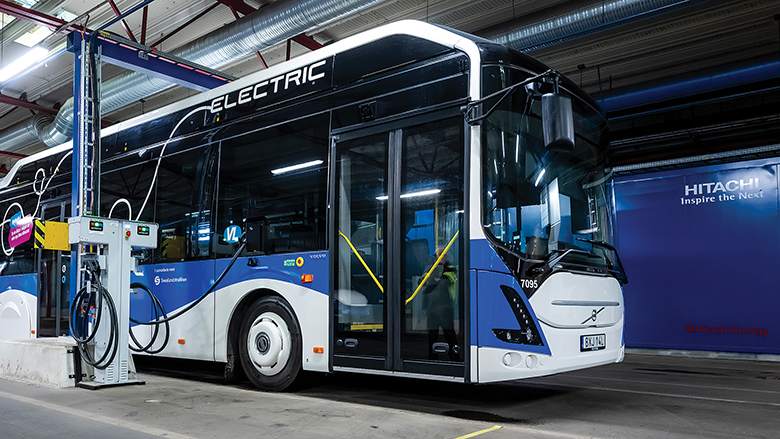
With an ambitious goal of a 100 percent electric infrastructure and bus fleet, Réseau de transport de la Capitale (RTC), the greater Quebec City area public transit agency, has taken a significant step by partnering with Hitachi Energy to deploy a three-year pilot for a centralized, multi-vehicle electric bus charging solution. The project represents an important step toward the ultimate electrification of RTC’s entire bus fleet and infrastructure.
RTC has been electrifying transit since 2018. It aims to electrify all garages and serve all routes with 100 percent electric buses. The goal is to use one of its newly electrified maintenance facilities to phase in the first all-electric buses starting in 2026.
The arrival of these first electric buses marks the beginning of the transition to the operation of an all-electric bus fleet. They are the first vehicles operated at The Newton Center, the third RTC operating center dedicated to electrification.
The project to electrify 55 percent of its urban buses and 65 percent of its school buses by 2030 supports the Quebec provincial government’s 2030 Plan for a Green Economy, a critical objective in Canada, where transportation accounts for about a quarter of total greenhouse gas emissions.
RTC awarded Hitachi Energy the contract for the charging equipment for RTC’s all-electric bus trial. It’s Hitachi Energy’s first award for bus charging infrastructure in North America.

The technology selected for the pilot is Hitachi Energy’s
Grid-eMotion® Fleet solution. This integrated charging system can deliver multi-megawatt level charging capabilities tailored to the demanding requirements of urban bus fleets. Typically, bus terminals in city environments are space-constrained and not ideal for electric buses, requiring compact, scalable, and space-saving systems. Fortunately, this system requires 60 percent less space than conventional charging systems and a 40 percent decrease in required depot cabling. This grid-to-plug solution has already been deployed in sustainable transport projects at some of the biggest urban bus systems in the world, including London, United Kingdom, Västerås, Sweden, and Brisbane, Australia. The pilot project will provide valuable data on the best strategies for charging large numbers of vehicles.
One of the project’s key goals is to explore different fleet charging strategies in an active bus terminal, including traditional plugs and overhead pantograph systems. Hitachi Energy’s
Grid-eMotion® Fleet technology can provide TRC and other public transit agencies with much-needed flexibility to address the unique needs of each facility.
“Hitachi Energy is proud to support the RTC energy transition through our Grid-eMotion® Fleet pilot deployment,” said Alireza Aram, managing director, Grid Integration North America, Hitachi Energy. “This project offers a great opportunity to demonstrate how charging systems designed specifically for fleets can play a critical role in transitioning our urban transit systems to fully electric operations. This exciting project enables us to explore different approaches to EV fleet charging in a real-world environment, gathering data that can be applied with public transit agencies worldwide.”
About the Technology
Grid-eMotion® comprises two unique, innovative solutions – Fleet and Flash. Grid-eMotion® Fleet is a grid-code-compliant and space-saving grid-to-plug charging solution that can be installed in new and existing bus depots. The charging solution can be scaled flexibly as the fleet gets bigger and greener. It includes different charging point configurations and a robust and compact grid connection directly at the distribution voltage level. The system is also available for commercial vehicle fleets, including last-mile delivery and heavy-duty trucks that require high-power charging of several megawatts. Grid-eMotion® Flash enables operators to flash-charge buses within seconds at passenger stops and fully recharge within minutes at the route terminus without interrupting the bus schedule.
Both solutions are equipped with configurable smart charging digital platforms that can be embedded with larger fleet and energy management systems. Additional offerings from Hitachi Energy for EV charging systems consist of e-mesh™ energy management and optimization solutions and Lumada APM, EAM, and FSM solutions to help transportation operators make informed decisions that maximize their uptime and improve efficiency.
Hitachi Energy’s solution has been tested at RTC’s Metrobus Center and is expected to run at full capacity in 2024.
